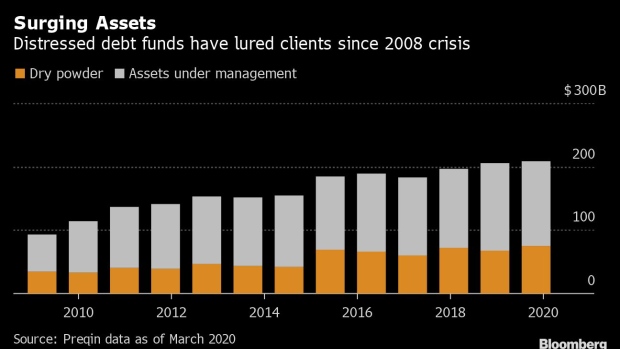Oct 9, 2020
Distressed Debt Funds Target Companies Facing Loss of Covid Aid
, Bloomberg News

(Bloomberg) -- Europe’s distressed debt funds are intensifying the search for opportunities among the region’s highly-indebted companies as governments begin tapering support offered during the peak of the coronavirus pandemic.
Funds are monitoring the debt of companies including cinema operator Cineworld Group Plc, Spanish ferry company Naviera Armas and German holiday giant TUI AG, according to people familiar with the matter who asked not to be identified. They anticipate that the end of state assistance, combined with virus-related restrictions on trade, could intensify these companies’ woes.
Debt classified as distressed has slumped to 4 billion euros ($4.7 billion), down from about 19 billion euros at the peak of the crisis in March, Bloomberg Barclays index data show, partly due to almost 41 billion euros in government-backed loans. But the dry spell for distressed debt funds that raised huge cash piles during the pandemic now looks set to end.
U.K. government support for furloughed employees will drop sharply from Oct. 31, while borrowers in both the U.K. and Germany face a tightening of insolvency rules this month.
“The substantial financial support measures that have done much to shore up the markets are already starting to taper off,” said Duncan Priston, the London-based co-head of European distressed credit at HIG Bayside Capital.
Read more: Germany Faces Wave of Insolvencies as Filings Waiver Ends
PricewaterhouseCoopers expects debt restructurings and insolvencies to start increasing globally in the final quarter of this year or first quarter of next as support measures fall away, according to a recent report. Companies in hospitality, leisure, travel, tourism and retail will be particularly hard hit, the firm said.
“The immediate priorities will include repairing the balance sheet and dealing with the debts accumulated during lockdown,” PwC wrote in the report.
Cineworld, the world’s second-largest cinema chain, looks vulnerable. The company is preparing to start talks with creditors after warning it’s at risk of breaching loan covenants in December. It’s suspending operations at movie theaters after winter blockbusters, including the latest James Bond movie, were postponed.
Naviera Armas bonds are quoted at around 48 cents on the euro, while TUI’s are currently quoted at around 93 cents. While Cineworld doesn’t have any bonds its euro-denominated loan fell to around 60-65 cents earlier this week.
Representatives of Cineworld as well as Naviera Armas declined to comment for this article. A TUI spokesman declined to comment beyond a recent company statement saying the company is evaluating various measures to improve its balance sheet and maturity profile.
Credit insurance company Euler Hermes expects its global insolvency index to hit a record high of +35% by 2021, with the hotspots including U.S., Brazil, U.K. and Spain.
A premature withdrawal of supportive policy measures could increase the surge in insolvencies by 5 to 10 percentage points, according to the firm.
David Grant, managing partner at law firm Locke Lord in London, said that the desire to support companies “come what may” has faded.
“The word that is being used a lot is carnage,” he said.
(Reworked third graph to clarify amount of distressed debt)
©2020 Bloomberg L.P.